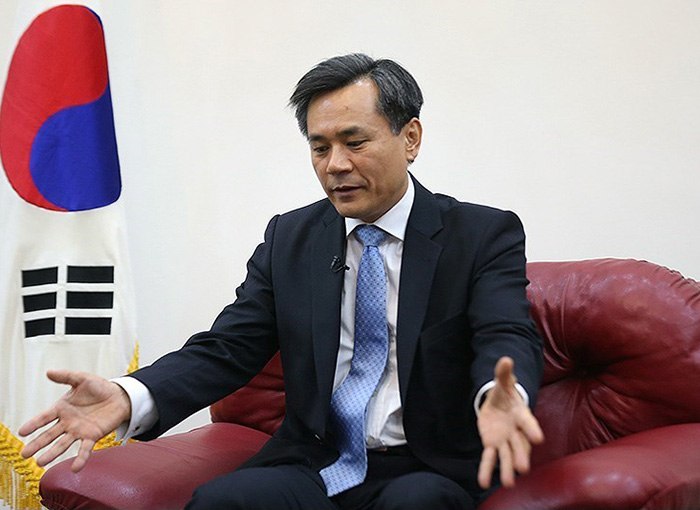Here is IFP’s translation of excerpts from a report by Fars:
Addressing an international exhibition on stock exchange, banking and insurance (FINEX 2016) held in Tehran on Monday, July 11, Kim Seung-ho emphasized that the signatories of the nuclear deal between Tehran and world powers [Joint Comprehensive Plan of Action, also known as the JCPOA] are obliged to take the necessary steps to reopen banking transactions as soon as possible.
“The President of South Korea, accompanied by a team of senior government officials, travelled to Iran shortly after the JCPOA was clinched between the country and the Group 5+1. I truly hope a day comes when we can expand our economic and trade relations,” he said.
Ambassador Kim: In spite of JCPOA, South Korean Foreign Ministry still has to smuggle money into Iran using briefcases!
Kim described full implementation of JCPOA by its signatories as a necessary step and noted, “The implementation of JCPOA can make a big change in Iran’s economy and I, as a diplomat, believe that the country has entered a new era and can write a new page in its history; a page full of good news for its people.”
“South Korea is impatient to be a big part of the good news,” he noted, adding, however, that writing on that page needs ink and the ink is the reopening of banking transactions.
In the post-sanctions era, plenty of Western and non-Western countries have expressed their desire to revive and strengthen economic ties with Iran.
“It is necessary to re-establish banking and monetary transactions between Iranian and foreign banks and to boost joint ventures and investment,” he added.
He stressed that the parties to the nuclear deal are expected to ask their banks to transfer Iran’s money into South Korea.
“It is a shame that 6 months after the implementation of JCPOA, our Foreign Ministry has to smuggle its money into Iran using briefcases,” Kim went on to say.
“Prosperity will find its way into Iran’s market if the JCPOA gets the shackles off the country’s economy,” he said.
“Although the parties to the deal well know that they have to fulfil their part of the deal, the companies in the private sector refrain from doing business with Iran.”
Kim drew an analogy between these companies and two ships that are fighting each other, and said, “Companies in the private sector are worried that crossing the border might sink their ships.”
Kim described Iran as a safe investment haven and underlined, “It’s high time for the West to remove the obstacles and seize the opportunity to open a new chapter in its troubled history with Iran.”
He suggested that Iranians and their banks should make way into international financial systems and promote their banks to achieve international standards, which would guarantee a profitable investment.
The South Korean envoy stressed that Iran sits atop an 80-million market, plethoric natural resources and loads of untapped potentials.
He finally touched upon Iran’s estimable position in the region and the world, saying, “Iranian government should prepare plans to introduce the country’s untapped potentials to the world.”
